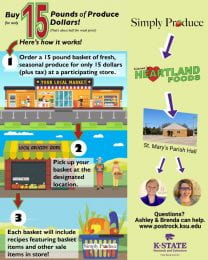 “Simply Produce” offers customers approximately 15 pounds of produce for $15.00. Produce baskets will contain a variety of fresh fruits and vegetables and may vary slightly from what is typically available on the produce department’s shelves. Basket contents will be different for each ordering period as well. In addition to produce, customers will receive a recipe highlighting basket items, as well as educational materials on food storage and produce handling.
“Simply Produce” offers customers approximately 15 pounds of produce for $15.00. Produce baskets will contain a variety of fresh fruits and vegetables and may vary slightly from what is typically available on the produce department’s shelves. Basket contents will be different for each ordering period as well. In addition to produce, customers will receive a recipe highlighting basket items, as well as educational materials on food storage and produce handling.
Produce baskets are purchased through the participating grocery store’s register and must be paid for at time of ordering. The purchase is taxable.
For the June distribution, baskets must be ordered June 10th through June 15th at Noon and distribution is set for June 18th from 12-12:30pm at the Mary’s Parish Hall, 403 US-36 in Smith Center. Customers will drive up to the Parish Hall and volunteers will bring out their purchased basket(s).
Produce basket distribution that utilizes local retail venues is designed to increase access to healthy fruits and vegetables for consumers, while stimulating positive economic impact and building regional food system sustainability. We are proud to partner with Gene’s Heartland Foods to promote this great opportunity for our residents.
For more information, please contact Post Rock Extension agents, Ashley Svaty (asvaty@ksu.edu) or Brenda Langdon (bklangdon@ksu.edu).







